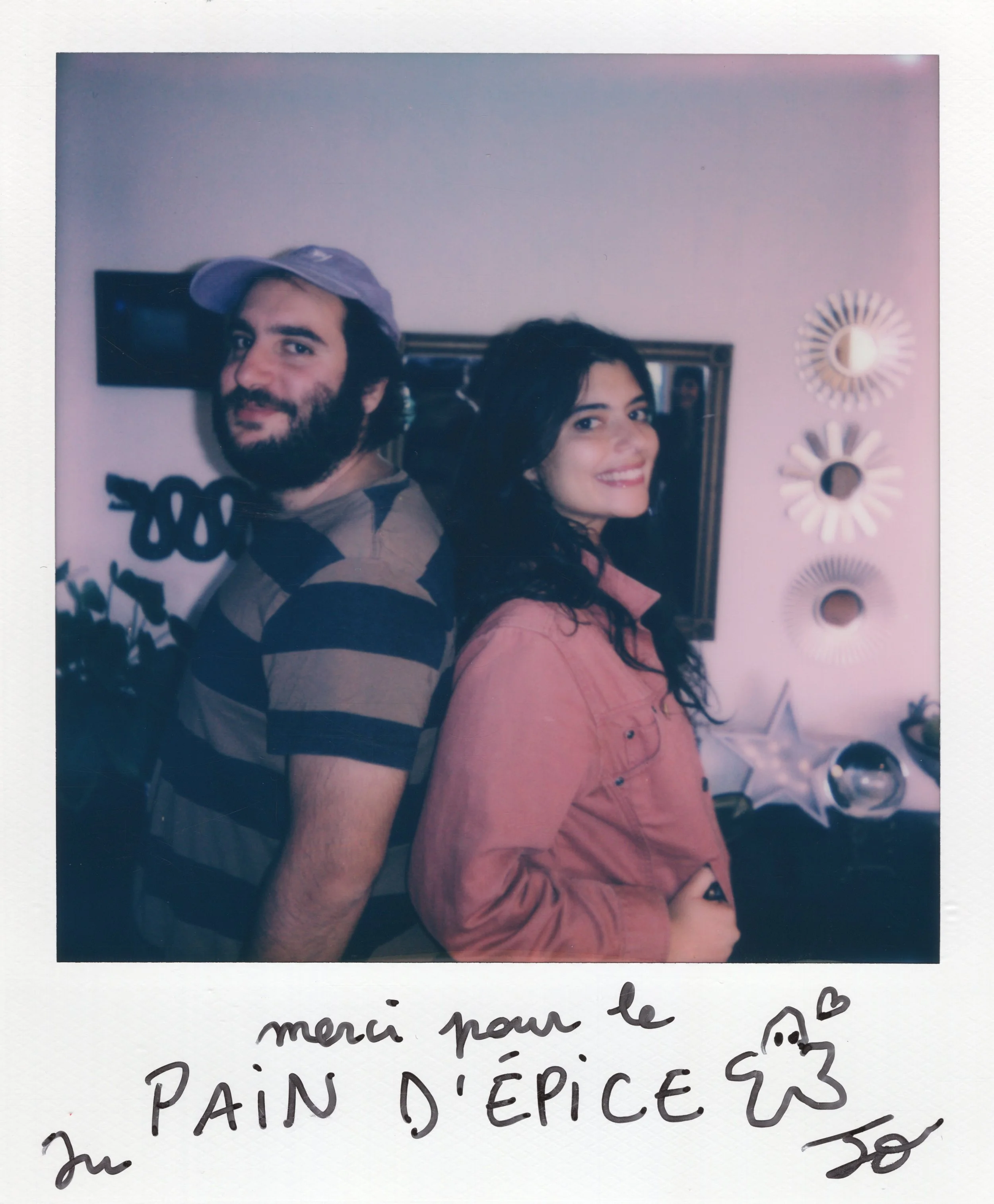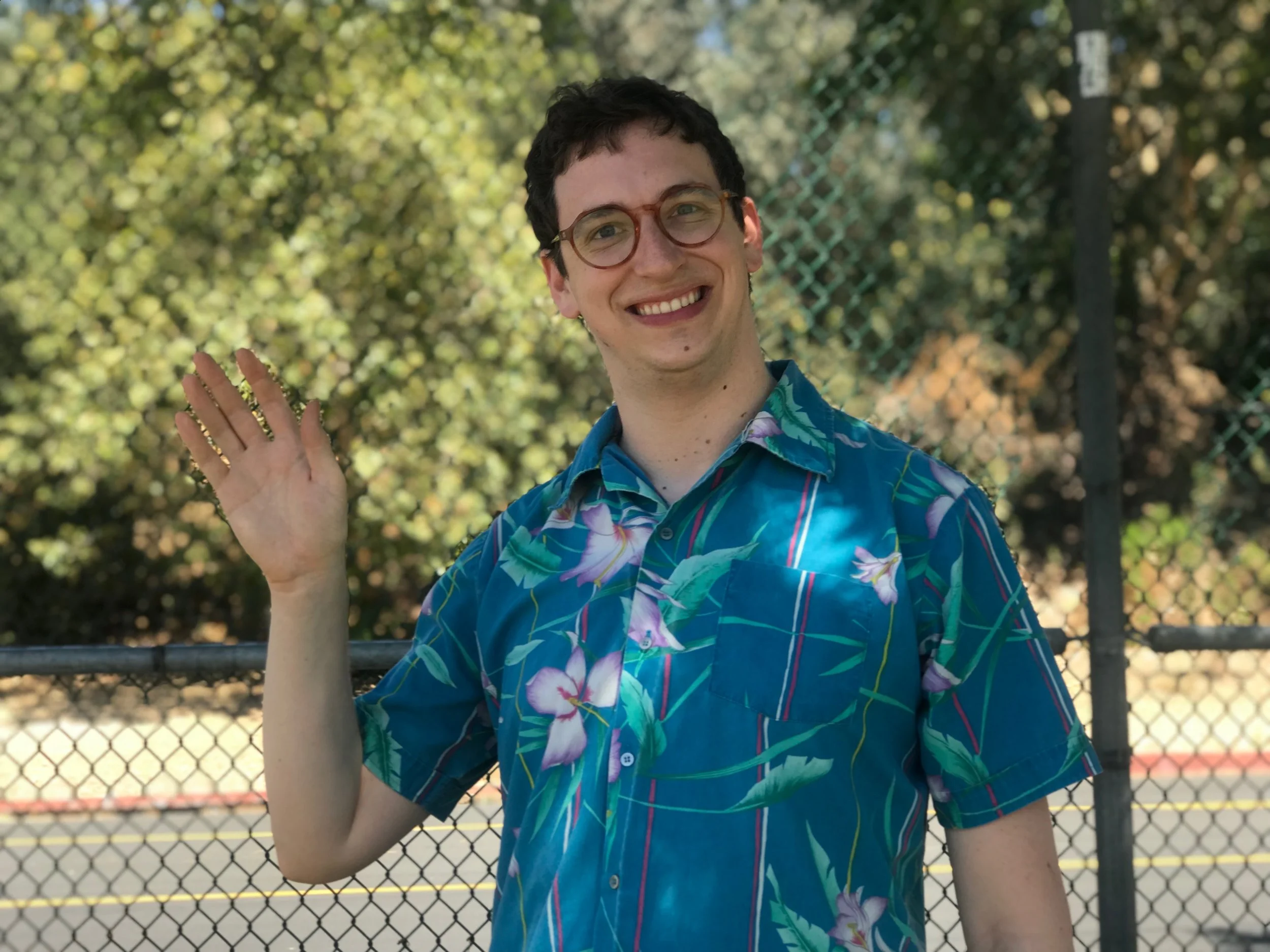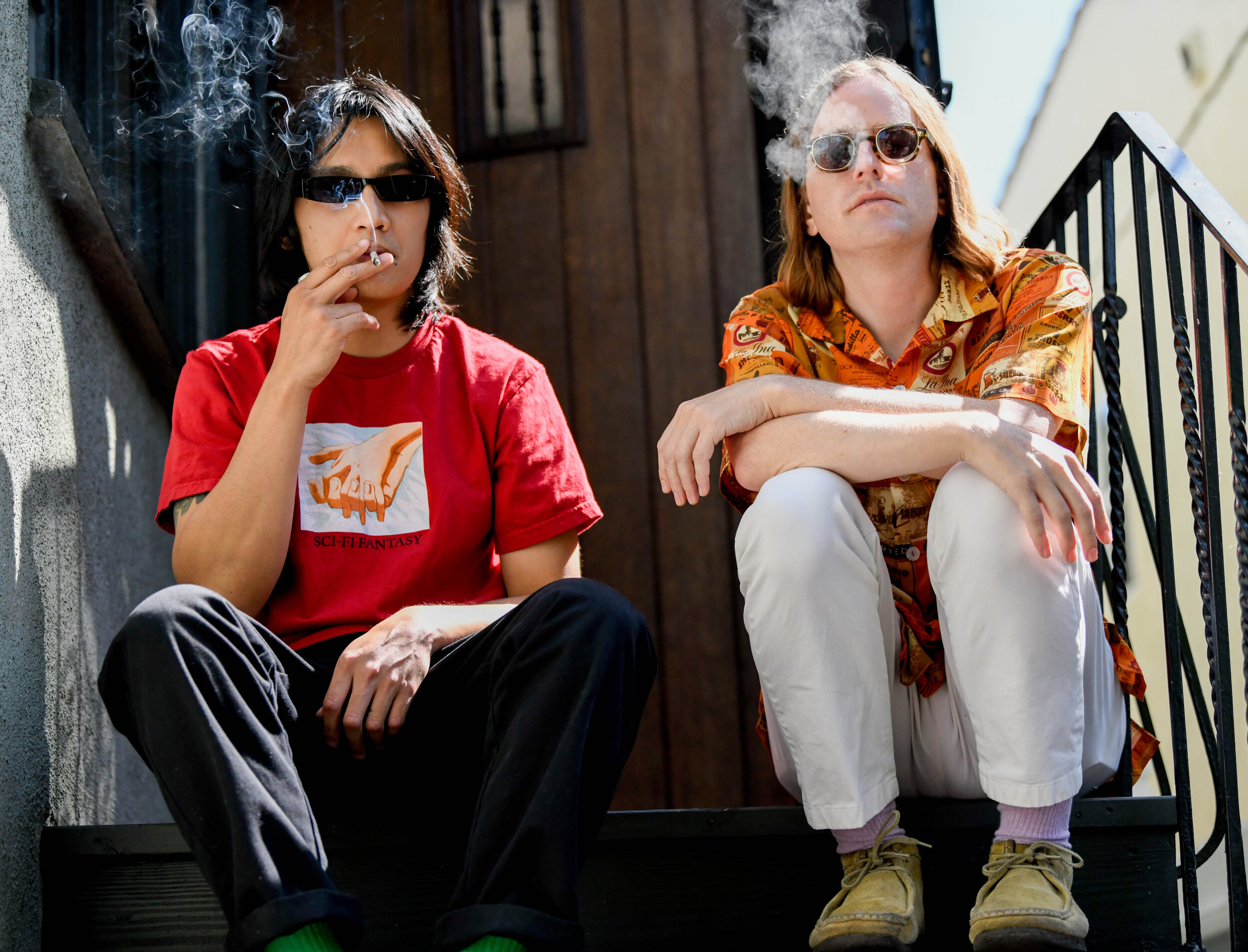A Conversation with Pearl & the Oysters
French-American duo Pearl & the Oysters aren’t originally from Los Angeles, but you’d be forgiven for thinking they might be. The pair’s laid-back psychedelic space pop evokes a sunshine-drenched soundtrack that feels tailor-made for Southern California. Repeated listens to their most recent album Flowerland [out now via Feeltrip Records], however, also reveal loving references to their native Paris, former adopted home of Florida, and musical muse Brazil. Indeed, Pearl and the Oysters have skillfully created a sonic postcard that deftly weaves disparate eras, genres, and landscapes into an inviting and warm world that is all their own.
On a sunny and mild autumn Silverlake afternoon, I sat down with Joachim Polack and Juliette Davis to talk about the Flowerland album, their musical journey from Paris to L.A., upcoming projects, and more.
Bobby Weirdo: So here we are together in L.A. What are your thoughts on living here? Is it long-term?
Juliette Davis: We’re not looking too far into the future, but we’ve been so happy here even though the Pandemic hit. It feels like a good place for us right now.
Joachim Polack: Yeah - I like it here, and it’s been great for a number of reasons: the music mecca thing is real, at least specifically for the kind of music we like and want to do. That’s not dissing France or Florida, but it’s special [here] because we’re surrounded by people who influence and inspire us. That creates a back-and-forth between friends, and I like that.
BW: When you were in France and later in Florida, what music were you hearing that you associated with L.A.?
JP: A lot…
JD: We felt pretty close to Stones Throw [Records].
JP: Yeah, all that stuff. Definitely Mild High Club, Jerry Paper, and Drugdealer. And some of those people aren’t from here, but [they] ended up here. It felt like the sound of L.A., where all this exciting music that we love is coming from.
JD: We’re also excited by a town that has so many studios, and [about] living in a place where people are so passionate about music and recording. There’s just so much talent.
JP: There’s a second layer of people who are playing in bigger bands, but aren’t exactly prominent – that’s been the best surprise for me. Those are the people you end up making the most music with and who have access to studios. They’re just super stoked and here for the same reason we are, so it’s cool.
Riley Geare, who played in Unknown Mortal Orchestra, has a studio in Culver City. We met him through our current bass player, became friends, and now we make a lot of music with him. There are all kinds of people like that – people like Jonny Kosmo, who is in the neighborhood– and it’s really cool. And there’s Dent [May] of course, who we knew [already].
When we recorded the song “Candy” with him, I was visiting, and that was the first time he brought someone else to what became his studio Honeymoon Suite. He told me that we should try living here and that it was great. He was encouraging.
BW: Juliette and Jo, you met each other in high school, and just coincidentally both have one French parent and one American parent. You have American mothers, and French fathers, right?
JP: Yes.
BW: Yet neither of you have a surname that sounds stereotypically French, to my ears at least.
JP: Yeah, that’s true. Davis is British, right? Was it your great grandfather?
JD: My supposed great-grandfather was British, but I shouldn’t have been a Davis.
JP: We just found that out! And my dad’s family are Polish Jews, so Polack is a name that is fairly common in the States – I feel like I’ve seen it more here than in France.
BW: Growing up in Paris, you both had training on – or at least capabilities with – multiple instruments. Juliette, you played violin, flute, and trumpet.
JD: I was obsessed with the trumpet as a kid, but played violin until I had my front teeth. So I just played violin for a few years before transitioning to trumpet, and that was my first real serious instrument. I also learned piano because my father always said that [regardless of your chosen] instrument, you have to know how to play piano – it’s harmony, and it’s too important [not to].
So it was mainly trumpet, and then I learned flute when I moved to Florida. During a boring summer, I picked up the flute…
JP: And you taught yourself!
JD: I taught myself, yeah.
BW: You’re both singers, and Jo, you also play keyboards and violin.
JP: I did play some violin on the record. I used to play violin a lot – I was at a conservatory for years. I started when I was seven, and stopped sometime in college. Flowerland is the first time I played violin on [my own music].
I started playing piano when I was eighteen, in college. I got into jazz school, and did that for a few years.
BW: Is one of you a bassist? The bass is a huge part of Flowerland.
JP: Yeah, I play bass too. That was my first rock instrument. I started around thirteen, and I played a lot throughout high school in a couple bands. For years in Paris, people only called me for bass. I picked up keys later, so I didn’t work as a keyboard player, which feels funny because ever since I moved to The States, nobody knows I play bass.
I’m not playing bass on every track of Flowerland, but it’s me on most of them.
BW: The entire Flowerland album is exceptional as a whole, but I did want to ask about a couple tracks that especially stand out to me. First of all, “Rocket Show” is a waltz, which is interesting in and of itself. Even by the time The Beach Boys did tracks like “Time to Get Alone” or “Friends”, Brian Wilson was talking about the idea of “keeping waltzes alive.”
It’s fascinating that a form of music that used to be so prevalent in pop music is now so rare, and I’m curious how you get into a mode to compose something in that time signature, and move away from 4/4.
JD: It was the mood I was in when I was playing with the drum machine. I like to start with a beat on the drum machine, and then write on top of that. It fit the bitter-sweetness that I had in me when I was writing the song.
It’s true that waltzes are rare in pop the last few decades, but I didn’t think of it then.
As inspiration, I think I had the idea of an alien waltz – exotica, using an old school dance rhythm. I visualized the contrast of something like ballroom dancing in space. And there’s a song I really recommend called “La Java Martienne” by Boris Vian that I think was in the back of my mind when I wrote “Rocket Show”.
JP: We have that love for old-timey [music], like the Tin Pan Alley stuff that influenced Brian Wilson and Paul McCartney. That definitely comes from Juliette, and her father plays in a band that specifically plays that kind of music.
BW: And he played vibes on Flowerland, right?
JD: Yes, he did.
BW: We’ve spoken offline before about how sometimes Pearl & the Oysters might avoid an overt musical reference, like The Beach Boys, instead opting to reference something which in turn references another influence of yours. Referencing a reference, as it were. So an example for Pearl & the Oysters might be referencing The High Llamas, who in turn reference The Beach Boys.
JP: Definitely.
BW: To my ears, another one of your indirect references to other genres and eras comes via The Cardigans – specifically their earlier albums like Emmerdale, Life, and First Band on the Moon.
JP: Absolutely – one hundred percent. I love that band and the album First Band on the Moon so much.
Sometimes I’m humming something and think it’s off [The Beach Boys’] Smile, or something like that. Then I’ll realize it’s The High Llamas. That happens a lot from referencing something which [in turn] references something [else]. It becomes a hybrid sound, filtered through different eras, but there’s always that lounge component.
High Llamas is an important nexus for the sound we try to make, because they channeled it in a cool way – the lounge, early electronic music, novelty records, The Beach Boys…they packaged all that stuff in a unique way that influenced a lot of bigger acts who got more recognition [than High Llamas did].
JD: We were born in 1990, so we didn’t grow up with any of this. It was new [to us].
JP: We didn’t – it’s true. We came to High Llamas and Stereolab a decade after [that music] was made. It was the last year of high school, first year of college that we first heard of Stereolab.
I had no idea how cult they were in The States, or were going to become. But when we got to Florida, every person who found out we were French would say, “Oh, are you into Stereolab?” It was weird – I don’t think people care about them in France to the extent that people do here.
BW: “Evening Sun” on Flowerland has a real emotional impact, and is such a great track.
JD: It’s our favorite.
BW: Is that a vocoder you’re using on it?
JP: Yes. I have a hard time getting the vocoder tones that I really like, but it’s on there.
BW: You’ve got a one-month U.S. tour coming up…
JD: With Dent May and Luna Luna, in March and April of 2022.
BW: What else is coming up for Pearl & the Oysters?
JD: We’ll be collaborating with a French band named Biche.
JP: They’re definitely my favorite band in France, and objectively probably the best current French psych rock band in existence. They do it effortlessly. I feel like whenever French bands try to do psych rock in French, it’s a bit off. But they just write good lyrics, and it’s really compelling.
So we’re going to do an EP split with them – they’re doing two songs and we’re doing two songs. It’s going to be the first two songs that we’ll put out in French.
JD: That’s going to probably be early 2022.
BW: Cool – I’m excited!
Cover photo: WMF






